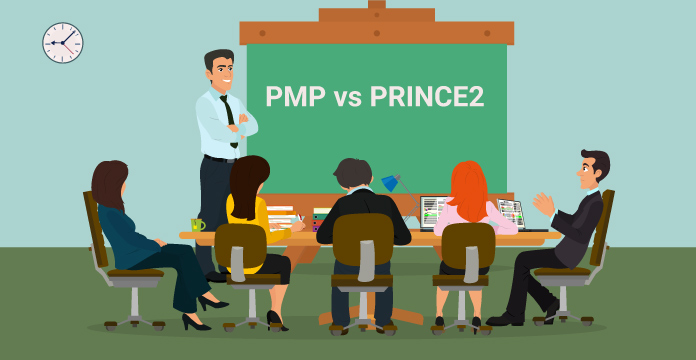
PRINCE2 Vs PMP After having certain years of experience in handling a project or being a part of the project team, there comes a time when you have to move ahead in your career. Today, certification seems to be the right way to move up to the higher echelons of management in an enterprise. But there is a certain dilemma among project practitioners across the globe with regard to which project management certification is right for them.
As there are various project management approaches in PMP, PRINCE2, Agile Project Management, and others. Online PMP Certification Training and Projects IN Controlled Environments (PRINCE2) are the two most in-demand project management credentials by both professionals and employers around the world. PRINCE2 credential is more popular across the UK and European countries, whereas PMP is popular across the US, Asia-Pacific, and MENA regions. The governing body for PRINCE2 certifications is AXELOS and Project Management Institute Inc. is the governing body for providing PMP certification.

Both PMP and PRINCE2 certification make up two different project management frameworks, where each methodology has its own best practices, and making a tough choice between them depends on various factors. The choice of certification should be based on the organization, type of industry, and the project one is being involved in.
Why go for PMP Certification?
PMP stands for Project Management Professional and is one of the most widely recognized project management certifications in the world. This PMP course is governed by Project Management Institute (PMI). Enterprises across the globe use PMP credentials as a benchmark while hiring project managers to handle or be part of business-critical projects. Professionals with PMP credentials can work across industry verticals, with any methodology, and in any location. Having PMP certification also increases your earning potential. According to PMI’s “Earning Power: Project Management Salary Survey, 9th Edition”, PMP certification holders earn nearly 20% more than their uncertified peers and are among the best in the industry. The PMP certification has to be renewed every 3 years by collecting 60 PDUs.
Why go for PRINCE2 Certification?
PRINCE2 which stands for ‘Projects IN Controlled Environments is a highly-rated project management methodology that offers a robust structure for delivering a successful project with clear templates, processes, and steps. The governing body for PRINCE2 certifications is AXELOS. PRINCE 2 certifications are divided into two certifications: PRINCE2 Foundation and PRINCE2 Practitioner. PRINCE2 Foundation certification is valid for life, whereas PRINCE2 Practitioner certification needs to be renewed every 3-5 years by giving the exam.
PMP vs PRINCE2: Benefits of Having PMP Certification
1. With PMP Make your Resume Stand Out:
Hiring managers across the globe usually consider widely-recognized certifications such as PMP more than anything else. A PMP credential demonstrates that you have the required skills to take on project challenges and have the knowledge to successfully finish the project from start to end, and one who is committed to his/her development.
2. Improved Salary Prospects with Global Opportunities:
The immediate change that you can see with the PMP credential is a better salary package than your non-certified peers. According to Payscale.com, PMP-certified professionals is can earn up to ~USD 125,000 with global opportunities.
3. Provides Better Networking Opportunities:
PMP is not like other certifications, it has a validity of up to 3 years, then you have to earn 60 PDUs to maintain your PMP certification. This results in attending PMI conferences and seminars, where you meet professionals from a similar background who share your experiences and ideate on the same.
4. Benchmarks your Project Execution Skills:
When it comes to PMP, the comprehensive knowledge gained will help you benchmark your project execution skills and improve the overall productivity of your project team. PMP is based on the PMBOK® Guide – Fifth Edition, which validates your knowledge of best practices and principles of project management.
5. PMP is Acknowledged Across Various Industries:
PMP certification is acknowledged across industry verticals when it comes to practical application. PMP is not restricted to any methodology or standard and is widely accepted across industries such as Banking, IT, telecommunications, Construction, Aerospace & Defense, Utilities, and more.
PMP vs PRINCE2: Benefits of Having PRINCE2 Certification
1. Comprehensive Methodology to Manage Projects:
Unlike PMI’s PMP, PRINCE2 is an effective Project Management methodology. The difference lies in “process” and “Body of Knowledge”. PMP is all about providing best practices for managing projects across the globe in a standardized format. In fact, it stays away from recommending what processes to follow while managing projects and that is where PRINCE2 comes into the picture, it fills the void left behind by PMP.
2. Justifies the Entire Project Even Before it Starts:
PRINCE2 methodology requires complete business justification at every level. The project should provide regular updates on business cases at various junctures of the project lifecycle to ensure the intended value will be delivered to the enterprise and its clients. Failure to do so will result in terminating the justification to continue with the project.
3. PRINCE2 can be Tailored to Suit any Project in Size and Complexity:
The best part of PRINCE2 is that it can be tailored to any project size and complexity. In PRINCE2 you can never remove a process. The processing activity must be completed, but you can tailor the process to suit the appropriate environment. Moreover, a lot of resources and time are saved as PRINCE2 is an embedded methodology, which means, PRINCE2 will be applied to all aspects of the organization.
4. Improved Salary Prospects with Global Opportunities:
Professionals with PRINCE2 credentials have a higher chance of landing their dream job and one that pays well. Especially in countries like the UK, Europe, Australia, and Asia, your employer has all the required justification of your skills to give you an improved pay rise. According to Payscale.com, the highest average annual salary for professionals with PRINCE2 certification is in the range of ~USD 60,000 to ~USD 123,000.
The below table should be able to give you a fair idea of the subtle differences between the two widely recognized project management certifications.
| PMP® | PRINCE2 Foundation | PRINCE2 Practitioner | |
| Subject | Project Management Knowledge | Project Management Methodology | |
| Deals with Project | How? | What? When? Whom? | |
| Popular in | US, Canada, Australia, Middle East, and Asia | UK, Europe, and Australia | |
| Reference Material | PMBOK® Guide – Fifth Edition, but not limited to | PRINCE2 Official Manual, Managing Successful Projects with PRINCE2 | |
| No. of Exam Questions | 200 | 75 | 8×10 |
| Exam Type | Multiple choice | Multiple choice | Scenario-based paper ( |
| Exam Result | Through psychometric analysis | 50% | 55% |
| Exam Duration | 240 minutes | 60 minutes | 150 minutes |
| Extra time for the second language | None | 15 minutes | 30 minutes |
| Open Book | No | No | Yes |
| Exam Venue | Prometric center | Training provider-approved place / online | |
| Pre-requisites | 3 yrs of experience in the project management field (5 years if you don’t have a four-year degree)At least 4,500 hours of experience in leading and directing projects (7,500 hours if you don’t have a four-year degree) and 35 hours of formal project management education (35 PDUs) |
No prerequisitesFormal training by PEOPLECERT accredited training provider | PRINCE2 Foundation CertifiedFormal training by PEOPLECERT accredited training provider |
| How to Register? | You have to register at pmi.org by submitting an application form of your work experience and take the exam at a Prometric center nearby to your location | By registering through PEOPLECERT accredited training organization for the examination through paper-based / online exam | |
| Validity of certification | One has to renew PMP certification every 3 years by acquiring 60 PDUs | Valid for life | One has to renew PRINCE2 Practitioner certification every 3-5 yrs by taking an exam |
| Cost of the Exam | $555 | $365 (depends on training organization) | $485 (depends on training organization) |
Employers around the world have great demand for project practitioners. The demand for PRINCE2 credential holders is more in the UK and in Europe. Whereas the demand for PMP-certified professionals is more in the USA and the rest of the world. At the end of the day, it completely depends on the organization and the project type that you are handling to choose the right certification that suits your career. PMP certification is helpful for gaining a holistic view of project management and PRINCE2 mainly helps to understand the processes and people in a project.
Conclusion
Instead of looking for PMP vs PRINCE2, project practitioners should take their project management skills to the next level by undergoing certification training in both PMP and PRINCE2. It will help you to gain an in-depth understanding of project management approaches and implement PM techniques that suit the best to successfully complete the project.
Know more about Project Management best practices through Invensis Learning’s Project Management certification training on PMP Online Training, CAPM Training Courses, PRINCE2, Project Management Fundamentals, etc.

















